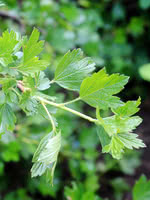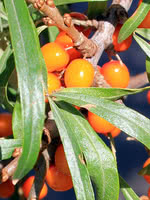Mon-Fri 9am - 5pm Mountain time
Sea Buckthorn (Seaberry) vs Northern Gooseberry
Ribes oxyacanthoides
Hippophae rhamnoides l.
Northern Gooseberry is a small, ornamental quality native shrub with prickly stems. You can plant it anywhere you'd plant Prickly Rose or Common Wild Rose, such as your yard.
Most people find Northern Gooseberry berries a bit tart for significant fresh eating but they are good for baking, wine or jam.
Sea Buckthorn, aka Seaberry, is a nitrogen fixing shrub that produces attractive berries high in vitamin C.
While we can't confirm claims that the berries are effective in treating various ailments, many people believe consuming the berries helps with arthritis, infections, and asthma, among other things.
Sea Buckthorn plants have attractive pale silvery-green leaves, dense branches, and large thorns, people like to grow in ornamental hedges or as a first row in a shelterbelt.
Note: these plants typically reach maturity and make their sex easily known (females producing fruit) in their 3rd or 4th year of growth. Our seedlings are too young to identify their sex.
Northern Gooseberry Quick Facts
Sea Buckthorn (Seaberry) Quick Facts
In row spacing: 0.9 - 1.2 m (3 - 4 ft)

